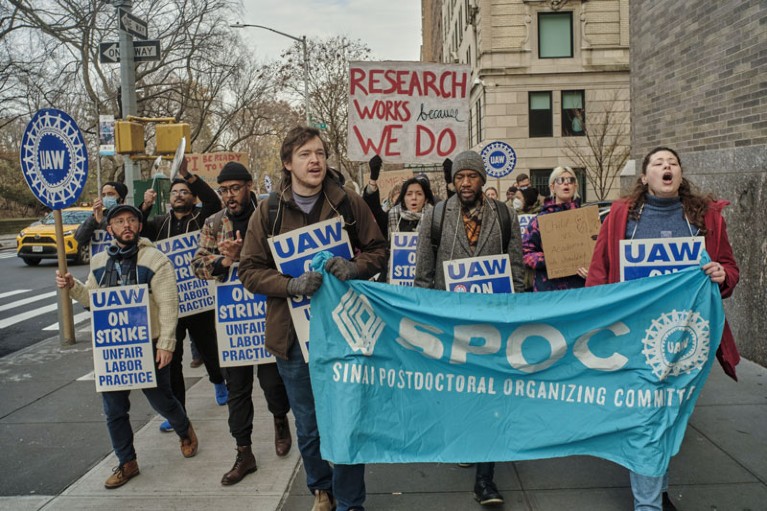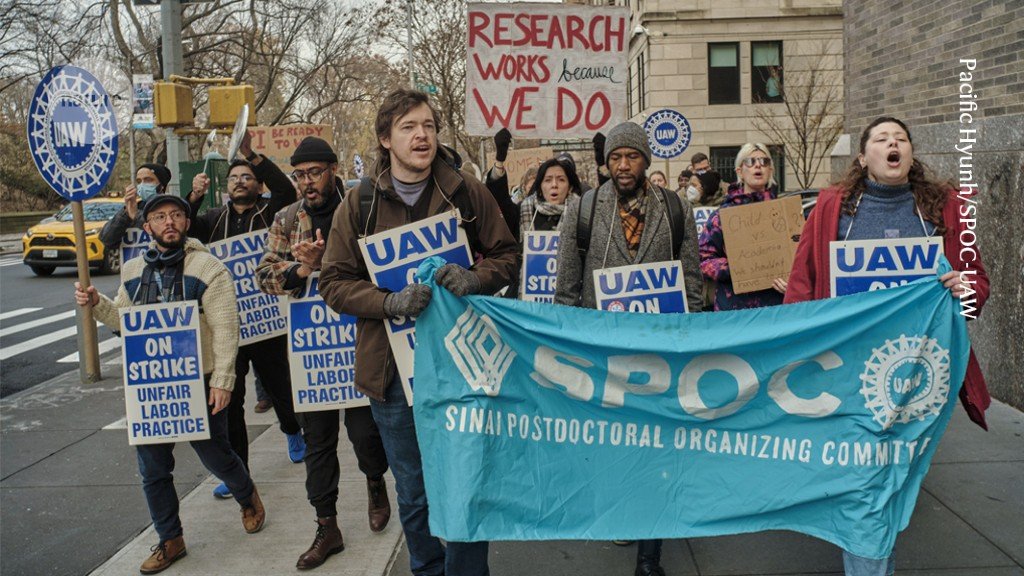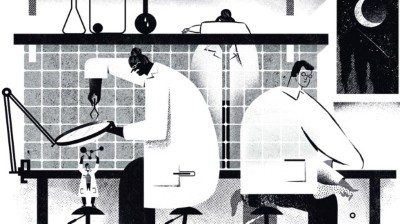
The Sinai Postdoctoral Organizing Committee has secured better pay and benefits for postdocs at the Icahn School of Medicine at Mount Sinai in New York City.Credit: Pacific Hyunh/SPOC-UAW
As the sole earner for his family of four, Balalgopal Pai’s starting pay in 2021 was US$62,500. Pai, a postdoctoral researcher at the Icahn School of Medicine at Mount Sinai in New York City, found it hard to make ends meet.
Groceries consisted of the bare essentials — and new clothes for his two children, after-school care and piano lessons were out of the question.
Although his family has subsidized housing, and his salary was raised to $70,000 in 2022 to account for his previous postdoc experience in Regensburg, Germany, the neuroscientist says that paying for basic necessities still remained a challenge. “We were living very close to paycheck to paycheck,” Pai says.
But last month, Pai and his fellow postdocs at Icahn received raises and several other perks. These came into effect on 22 December, marking the end of a 15-month union battle that raised the minimum salary of incoming postdocs at Mount Sinai by 24%, to $72,500.
Fixing unfair pay
“We know that postdocs are seriously underpaid,” says Andrea Joseph, a postdoc in chemical engineering, who along with Pai was part of the union organizing committee and was involved in salary negotiations. The committee says the deal is the highest minimum salary for postdocs in the United States. Joseph points out that the starting salaries for postdocs had not been raised since 2018, an added pressure in one the world’s costliest cities.
Career resources for postdoctoral researchers
According to the Worldwide Cost of Living 2023 survey by the Economist Intelligence Unit, a business-analysis group based in London, New York City tied with Geneva, Switzerland, for the third most expensive city to live in globally.
Nature’s global postdoc survey, released last October, found that some 62% of participants based in North or Central America are dissatisfied with their compensation.
This discontent has led to an exodus of postdocs from academia to industry. In the United States, for example, the median salary for someone with a life-science PhD in their first year in industry is double the median postdoc salary1. However, the Mount Sinai postdocs’ victory is part of a growing movement of successful union organizing efforts that have kicked off around the country, including at Columbia University, also in New York City, the University of California system and the University of Washington in Seattle.
Training: Getting an academic research position
Although Mount Sinai already provided subsidized housing to postdocs, the collective bargaining agreement strengthens protections, providing three years of guaranteed housing — the first time such a provision has been included in a postdoc union agreement, says Joseph. The agreement also offers up to up to six extra weeks of fully paid leave for new parents, as well as $1,500 for relocation expenses. Pai says he would have welcomed this money to offset the upwards of $6,000 he spent moving his family from Germany to New York in 2021. The agreement will also provide $1,250 in visa-related renewal costs for international postdocs.
Funding worries
But some are concerned about how the salaries will be funded. “I support unions in general and that postdocs be treated well,” says a Mount Sinai principal investigator who requested that his name not be used so he can speak freely without alienating the postdocs with whom he works. In the short term, he explains, principal investigators will have to dip into their labs’ rainy-day funds and cut down on supplies. “But I do think, in the long run, it’s going to lead to fewer postdocs being employed,” he warns.
Those cuts could have a larger impact. “If you have a hard and fast budget, and you’re paying a lot more for a postdoc, it’s going to change how you write your grant, what you promised to do,” says Donna Ginther, the director of the Institute for Policy & Social Research at the University of Kansas in Lawrence, who studies scientific-labour markets. “It’s going to change how science is done.”
In December, an advisory committee to the director of the US National Institutes of Health (NIH), the country’s federal funder of medical research, recommended an increase from $56,484 to $70,000 as the minimum stipend for its National Research Service Award, which is used as a guideline for postdoc pay levels. The NIH is still considering the feasibility of implementing the increase.
Meanwhile, Joseph says that the postdoc organizing committee at Mount Sinai will be taking the next steps to enforce the contract. The group is also supporting postdoctoral researchers organizing around the country, including peers at New York University and Weill Cornell Medicine in New York City, by sharing advice and contract-negotiation strategies and attending campaign events, “so we can build power and improve working conditions together”, says Joseph.




